Galvin, Brian  ORCID: https://orcid.org/0000-0002-5639-1819
(2024)
Scenarios development workshop at National Drugs Forum, 2023.
Drugnet Ireland,
Issue 87, Winter 2024,
pp. 27-31.
ORCID: https://orcid.org/0000-0002-5639-1819
(2024)
Scenarios development workshop at National Drugs Forum, 2023.
Drugnet Ireland,
Issue 87, Winter 2024,
pp. 27-31.
| Preview | Title | Contact |
|---|---|---|
|
PDF (Drugnet Ireland 87)
2MB |
Purpose of scenario development in drug policy
All foresight work involves developing a capacity to identify weak signals, considering how they may react within a specified environment, and determining the level of attention they deserve. Epidemiologists and drug policy experts anticipate greater diversity in patterns of drug use as the plant-based drugs that have dominated the picture in recent decades are partially replaced by synthetic drugs and polydrug use becomes increasingly common. Geopolitical changes, the emergence of new trafficking routes, and other supply-related factors add further complexity. As with any complex system, it is problematic to assign significance to a particular variable in the drugs field, especially if it is difficult to discern. We can easily overlook signals or fail to recognise their potential significance or predict what signals will become trends. There are cognitive as well as imaginative factors that can impede a thoughtful consideration of possible future events, but foresight helps us to identify what these barriers are and allows us to be more playful and open in considering signals. It is a valuable tool for developing anticipatory capacity and considering the range of possible outcomes from currently observable trends.
Scenario planning
Scenario planning presents a particular challenge. An approach that is often adopted in business and policy fields is to make our assumptions about the future explicit and then challenge them by imagining very different outcomes.1 By articulating or illustrating concepts of the future, they become part of the discourse, and our capacity to prepare for them helps us to make an impact in the present. This is the anticipation which is the goal of all foresight work. It aims to alert actors to possible developments before it is too late or while they still have some power to influence the course of events and, otherwise, to confront successfully the challenges that were hopefully anticipated. Ideally, this is developed in an environment where experts are encouraged to be creative, respectful of the expertise of other perspectives, and have access to quantitative evidence to support conclusions. But also to have access to qualitative data relative to the so-called ‘soft variables’, which may be difficult to discern but often play a determining role in shaping the future of a given topic, country or organisation; hence their importance in the analysis.2
Scenarios are internally consistent hypothetical yet plausible events, or series of events, constructed to enable us to see the processes that might lead to this event and inform the actions we can take to either bring it about or prevent it. Scenario planning identifies trends and key uncertainties which can then be combined to create a picture of the future. There are several techniques of scenario planning, but all begin with a definition of scope: what is the broad question we want to answer? Several trends are identified and from these key drivers for a scenario workshop are selected. Two extremes describe the ends of the spectrum of possible outcomes from these drivers. These outcomes are the key uncertainties, and two of these uncertainties can be combined to create the scenario matrix.3
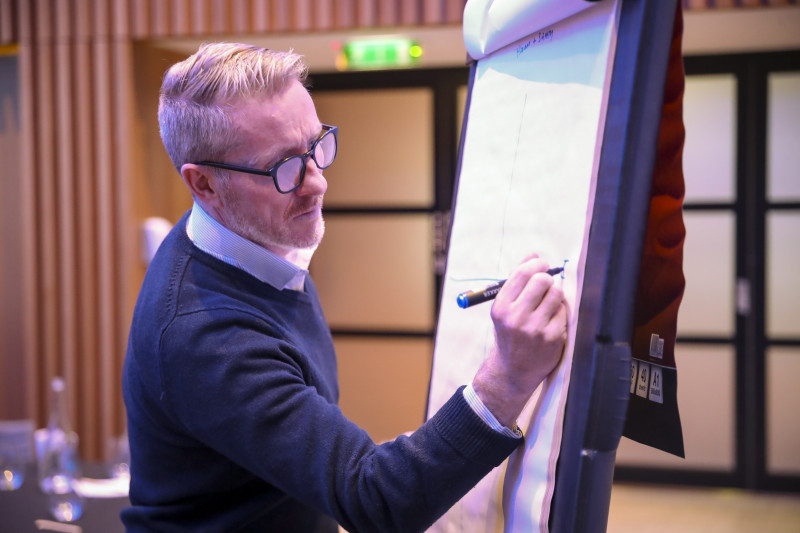
Trevor Bisset facilitating the workshop on strategic foresight, Imagining 2040, at the National Drugs Forum 2023
Scenario planning workshop
The aim of the scenario planning workshop at the National Drugs Forum, which took place on 16 November 2023 at Croke Park in Dublin, was to develop futures literacy among the forum participants by working with the notions of uncertainty and scenarios. The discussion held at the workshop was on the future of problem substance use among young people in Ireland in 2040, to identify potential future threats and to explore ideas and recommendations regarding response activities. The workshop was a very condensed approach to scenario planning, which can often take place over several days. The workshop organisers decided to use the Rip Van Winkle technique,4 in which participants are asked to imagine that they have just woken from a sleep of several years and must think of a number of questions they need to ask about the world they find themselves in. Each question has a ‘yes’ or ‘no’ answer and reveals aspects of what the questioner is uncertain about, which allows the identification of crucial and – simultaneously – ‘vulnerable’ assumptions about the future of problem substance use among young people in Ireland in 2040. It was decided to undertake this part of the exercise using an online survey of registered participants in the National Drugs Forum.
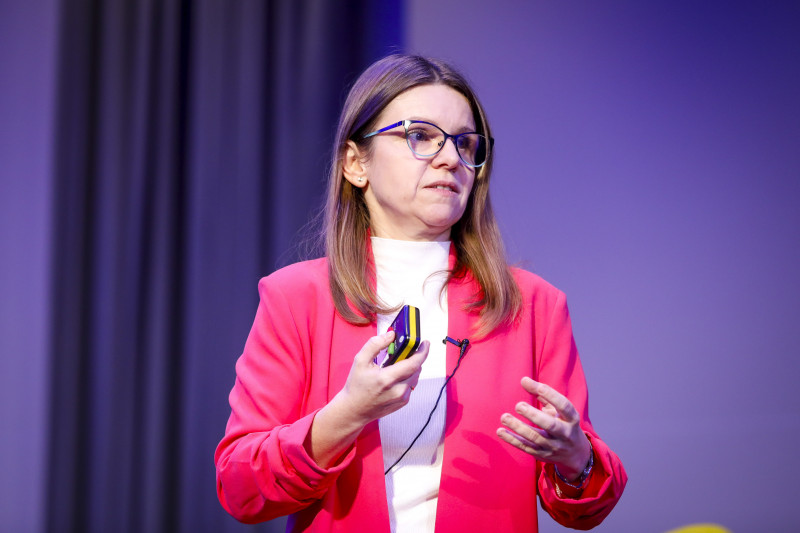
Dr Anna Sacio-Szymańska leading the workshop on strategic foresight, Imagining 2040, at the National Drugs Forum 2023
Identifying clusters of uncertainties
The survey identified a list of uncertainties, which was then arranged into 14 topic clusters. These defined the framework drivers of change for the workshop. Two extreme outcomes were assigned for each uncertainty cluster and the workshop participants were asked to select two uncertainties to construct the scenario matrix (see Table 1). Using these two key uncertainties, each group in the workshop prepared four scenario snapshots using a 2x2 matrix.
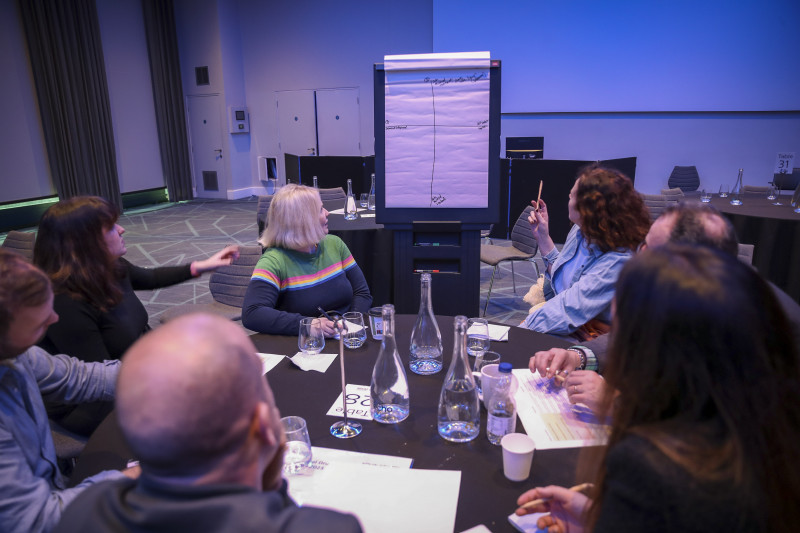
Imagining 2040 – participants engaging in the workshop on strategic foresight at the National Drugs Forum 2023
Scenarios development workshop
Nine separate groups participated in the workshop, where each created scenarios based on the two key uncertainties they selected. A group of stakeholders who had participated in a previous foresight exercise with the Health Research Board (HRB) volunteered to facilitate the tables at the workshop. National Drugs Forum participants willingly engaged in the work and there was lively and open discussion at each table. There was considerable variety in the key drivers chosen to develop the scenarios, and the results provided a fascinating insight into how people imagine the uncertainties that our 2040 colleagues will face. Table 2 presents a sample of some scenarios created during the workshop.
The scenarios development workshop at the National Drugs Forum complements the work on horizon scanning, a different but related foresight technique that the HRB is undertaking as part of DRUG-PREP, a European Commission-funded project. The findings of this research will be published in 2024.
Table 1: Scenario matrix based on 14 clusters of uncertainties
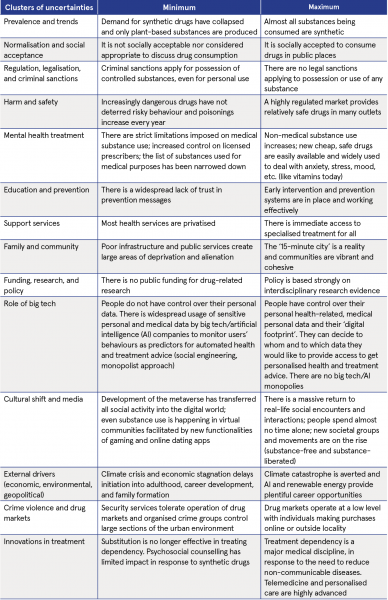
Table 2: Sample of scenarios based on two key uncertainties selected by group
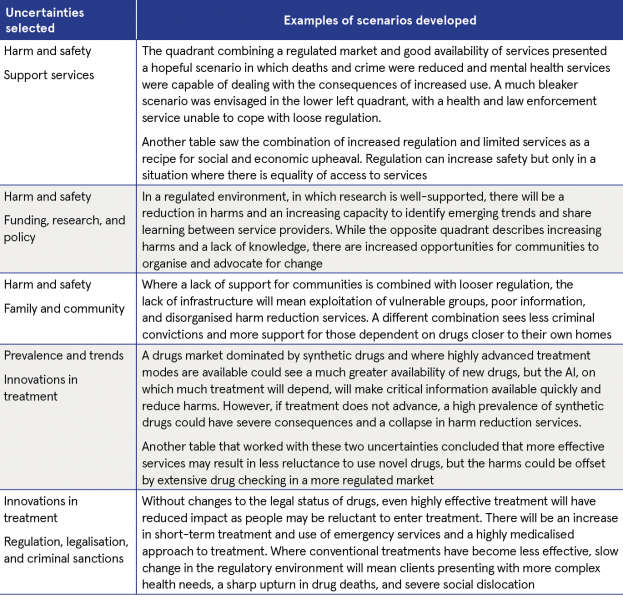
Conclusion
Researchers in strategic foresight often refer to the goal of ‘futures literacy’.5 One step in developing futures literacy is to use imagination and discussion to make assumptions about the future explicit and enable people to use their anticipatory capacity to describe what this future might be. A scenarios development workshop is a useful way of facilitating the generation of these ideas. While the workshop at the National Drugs Forum was a brief and limited exercise in strategic foresight, it confirmed that there was real interest and enthusiasm among stakeholders in engaging in this work and agreement on the relevance of foresight concepts to prepare for uncertainty in a complex and challenging policy area.
The HRB would like to thank all those who participated in the workshop and contributed to the lively and robust discussion. We particularly want to thank the facilitators who helped these discussions along with great skill and patience and have previously been involved in a number of HRB foresight exercises: Dermot King, Joseph Kirby, Paddy Clark, Bríd Walsh, Nicola Corrigan, Nicki Killeen, Aoibhinn King, John Doyle, Marie-Claire McAleer, Richie Stafford, Karen O’Connor, and Trevor Bissett.
A very special thanks to Anna Sacio-Szymańska from 4CF The Futures Literacy Company,6 who worked closely with the HRB in preparing for this event and provided expert guidance on the day. Anna’s deep knowledge of the discipline and her entertaining and insightful presentation made a deep impression on the forum delegates and ensured that the workshop achieved the aims set for it.
1 Ramírez R and Wilkinson A (2016) Strategic reframing: the Oxford Scenario Planning Approach. Oxford: Oxford Academic. Available from: https://doi.org/10.1093/acprof:oso/9780198745693.001.0001
2 de Jouvenel H (2019) Futuribles: origins, philosophy, and practices – anticipation for action. World Futures Review, 11(1): 8–18. Available from: https://doi.org/10.1177/1946756718777490
3 Bishop P, Hines A and Collins T (2007) The current state of scenario development: an overview of techniques. Foresight, 9(1): 5–25. Available from: https://doi.org/10.1108/14636680710727516
4 Dewar JA (2002) Assumption-based planning: a tool for reducing avoidable surprises. Cambridge: Cambridge University Press.
5 Miller R (ed.) (2018) Transforming the future: anticipation in the 21st century. Abingdon and New York: UNESCO Publishing and Routledge. Available from: https://unesdoc.unesco.org/ark:/48223/pf0000264644
6 For further information on 4CF The Futures Literacy Company, visit: https://4cf.eu/
F Concepts in psychology > Attitude > Attitude toward substance use
MP-MR Policy, planning, economics, work and social services > Policy > Policy on substance use
MP-MR Policy, planning, economics, work and social services > Programme planning, implementation, and evaluation
VA Geographic area > Europe > Ireland
Repository Staff Only: item control page